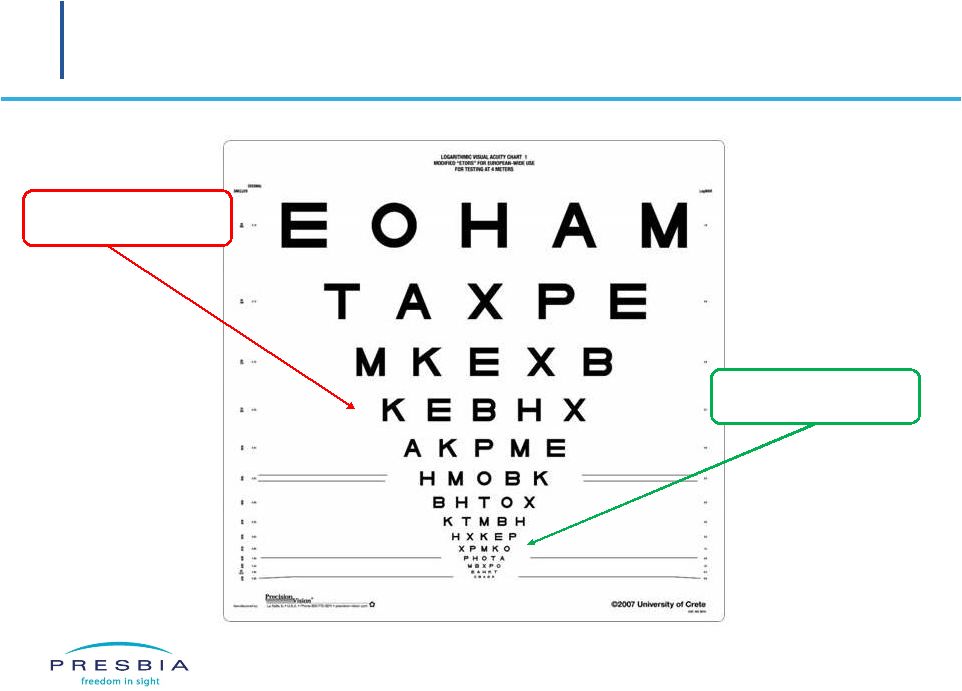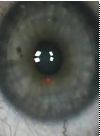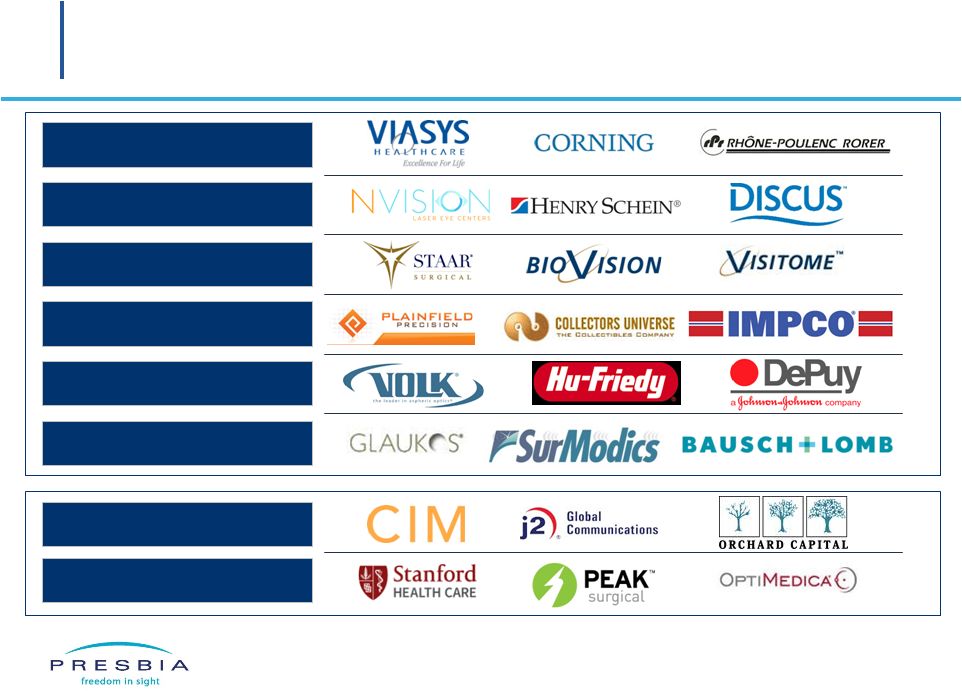Attached files
| file | filename |
|---|---|
| 8-K - 8-K - Presbia PLC | d932860d8k.htm |
 Jefferies
Healthcare Conference New York
June 2015
Exhibit 99.1 |
 CONFIDENTIAL
| 1 | To
the
extent
statements
contained
in
this
presentation
are
not
descriptions
of
historical
facts
regarding
Presbia
PLC
and
its
subsidiaries
(collectively
“Presbia,”
“we,”
“us,”
or
“our”),
they
are
forward-looking
statements
reflecting
management’s
current
beliefs
and
expectations.
Forward-looking
statements
are
subject
to
known
and
unknown
risks,
uncertainties,
and
other
factors
that
may
cause
our
or
our
industry’s
actual
results,
levels
of
activity,
performance,
or
achievements
to
be
materially
different
from
those
anticipated
by
such
statements.
You
can
identify
forward-looking
statements
by
terminology
such
as
“may,”
“will,”
“should,”
“expects,”
“plans,”
“anticipates,”
“believes,”
“estimates,”
“predicts,”
“potential,”
“intends,”
or
“continue,”
or
the
negative
of
these
terms
or
other
comparable
terminology.
Forward-looking
statements
contained
in
this
presentation
include,
but
are
not
limited
to,
statements
regarding:
(i)
the
initiation,
timing,
progress
and
results
of
our
clinical
trials,
our
regulatory
submissions
and
our
research
and
development
programs;
(ii)
our
ability
to
advance
our
products
into,
and
successfully
complete,
clinical
trials;
(iii)
our
ability
to
obtain
pre-market
approvals;
(iv)
the
commercialization
of
our
products;
(v)
the
implementation
of
our
business
model,
strategic
plans
for
our
business,
products
and
technology;
(vi)
the
scope
of
protection
we
are
able
to
establish
and
maintain
for
intellectual
property
rights
covering
our
products
and
technology;
(vii)
estimates
of
our
expenses,
future
revenues,
growth
of
operations,
capital
requirements
and
our
needs
for
additional
financing;
(viii)
the
timing
or
likelihood
of
regulatory
filings
and
approvals;
(ix)
our
use
of
proceeds
from
the
contemplated
offering;
(x)
our
financial
performance;
(xi)
developments
relating
to
our
competitors
and
our
industry;
and
(xii)
statements
regarding
our
markets,
including
the
estimated
size
and
anticipated
growth
in
those
markets.
Various
factors
may
cause
differences
between
our
expectations
and
actual
results,
including
those
risks
discussed
under
“Risk
Factors”
in
our
Annual
Report
on
Form
10-K
filed
with
the
Securities
and
Exchange
Commission
on
March
31,
2015
and
those
risks
discussed
under
“Risk
Factors”
in
our
Quarterly
Report
on
Form
10-Q
filed
with
the
Securities
and
Exchange
Commission
on
May
15,
2015.
Except
as
required
by
law,
we
assume
no
obligation
to
update
these
forward-looking
statements
publicly
or
to
update
the
reasons
actual
results
could
differ
materially
from
those
anticipated
in
the
forward-looking
statements,
even
if
new
information
becomes
available
in
the
future.
Disclosure |
 CONFIDENTIAL
| 2 | Key Contributors
Name
Title
Previous Experience
Randy
Thurman
Executive Chairman
•
Named Executive Chairman in January 2014
•
Director since October 2013
•
Held President and CEO positions in the medical device and pharmaceutical industries
for 25 years
–
VIASYS Healthcare Inc., Founder, Chairman and CEO; $1.45bn company
–
Corning Life Sciences Inc., Chairman and CEO; $2.3bn company
–
Rhone-Poulenc
Rorer
Pharma,
Inc.,
President
(now
Sanofi-
Aventis);
$4bn
company
Todd
Cooper
President, Chief
Executive Officer, and
Director
•
Named President, Director, and Chief Executive Officer in January 2015
•
More than 20 years of experience in the medical, pharmaceutical and consumer
products industries:
–
NVISION Laser Eye Centers, CEO; leading operator of ophthalmic surgery centers
–
Henry Schein, Vice President and General Manager; $10bn company
–
Discus, Senior Vice President; aesthetic based dental company owned by Philips
Healthcare
Vlad
Feingold
Chief Technology
Officer and Director
•
Innovator and leader with > 30 years in ophthalmic industry:
–
Principle inventor, with more than 50 patents issued, principally in optics
(ICL, injector, foldable IOLs)
–
STAAR Surgical AG |
 CONFIDENTIAL
| 3 | Business Highlights
•
113 million presbyopes in the U.S.; 1.8 billion presbyopes worldwide (2013)
Large, Underserved
Presbyopia Opportunity
Best-in-Class
Microlens Technology
Strong Leadership and
Compelling Business
Model
•
Refractive corneal inlay restores reading vision—on average 6 lines of improvement
better than competitors (AcuFocus and Revision)
•
Wide range of lens size refractive powers to offer patients a customized
therapy—competitors offer single size
•
Compatible with other ophthalmic surgical procedures (e.g. cataract surgery)—competitors
are not •
Senior ophthalmic and global medical device experience; major KOLs worldwide supporting
Presbia •
Compelling surgery center economics: 100% private pay, ~10 minute procedure time, leverage
large installed base of femtosecond lasers
•
Irish domicile
Clear FDA Pathway
Developed Ophthalmic
Surgery Market
•
Over 4,000 ophthalmic surgery centers with no effective treatment of presbyopia
•
Ophthalmic surgeons are highly motivated to develop this market to replace lost LASIK volumes
and utilize installed base of expensive femtosecond lasers
•
CE-marked, 700 lenses implanted globally with industry’s best safety profile
•
Ongoing U.S. pivotal trial targeting FDA approval Q4 2017 |
 CONFIDENTIAL
| 4 | Presbyopia
A Loss of Near Vision Affecting the Majority of People over the Age of 40
•
Clinical Advantages of the Presbia MicroLens
–
Presbia MicroLens is tailorable to a patient’s specific, desired near visual
acuity reading distance
–
Crystal clear material that is not visible to the naked eye
–
Outstanding safety profile and compatible with other ophthalmic
procedures
–
Average of 6 lines improvement
•
The Inconvenience of Presbyopia
–
Glasses off / on; lost glasses (can’t find them when you need them), etc.
–
Hassle of daily maintenance of contact lenses, especially among active
people
–
Difficulty seeing text/images on personal electronic devices such as cell
phones, tablets
•
The Vanity Factor
–
Reading glasses are one of the most ubiquitous signs of aging
–
Recent Bausch & Lomb survey found “almost half of women over the
age of 40 admit to feeling embarrassed, frumpy, or annoyed when
reaching for reading glasses” |
 CONFIDENTIAL
| 5 | Large, Underserved Presbyopia Opportunity
(billions)
Demographic-Driven Market Growth
1.8 Billion Presbyopes in Targeted Markets
Source: 2013 Market Scope.
United States
(113)
Western
Europe
(165)
Latin America
(140)
China
(423)
India
(249)
Rest of World
(542)
Other Wealthy
Nations
(71)
Japan
(58)
(millions) |
 CONFIDENTIAL
| 6 | No Capital Investment Required
Source: 2013 Market Scope.
Excess Capacity in U.S. LASIK Market
Microlens
TM
Procedure Uses Existing, Underutilized Femtosecond Laser Equipment
Existing Femtosecond Laser
(millions) |
 Clearly
Differentiated Microlens Technology |
 CONFIDENTIAL
| 8 | Microlens Surgical Procedure
10 Minute Procedure Utilizing Existing Femtosecond Laser
Femtosecond Laser
1
Creates a pocket in
patient’s cornea
3
Proprietary Insertion Tool
2
Proprietary Inserter
Surgeon uses inserter to implant
lens in patient’s cornea
Self-Sealing Pocket
Pocket self-seals, holding lens in
place at center of visual axis |
 CONFIDENTIAL
| 9 | Mechanism of Action
NEAR VISION
with Presbia Flexivue Microlens™
Peripheral portion of microlens helps focus
light from near objects (blue light rays) onto
retina
FAR VISION
with Presbia Flexivue Microlens™
Central portion of microlens allows light from
far objects to enter eye and focus clearly
(yellow light rays) onto retina
Peripheral portion of microlens causes some
far light to focus in front of retina
No significant change in binocular vision
UCVDA |
 CONFIDENTIAL
| 10 | Presbia Microlens Technology
•
Intracorneal
Refractive
Lens
implanted
in
a
pocket
in
cornea
of
non-dominant
eye
•
Hydrophilic
Acrylic
Material
similar
to
that
used
in
IOLs
for
>
20
years
•
A
True
“Microlens”
with
3.2
mm
diameter
and
edge
thickness
of
0.015
mm
•
Offered
In
A
Wide
Range
Of
Powers
ranging
from
+1.5
diopter
to
+3.5
diopter,
in
0.25
diopter
increments
•
Invisible
To
The
Naked
Eye
once
implanted
•
Compatible
with
other
ophthalmic
diseases (e.g., cataract)
•
Platform For Future Technologies
Presbia Flexivue Microlens™
Designed to Eliminate Need for
Reading Glasses
1.6 mm Central Zone Diameter
Boundary between Central and
Optic Zones Shown by Imaginary Line
0.51 mm Central Hole Diameter
3.2 mm Overall Diameter
Central Zone
Boundary between Central and
Optic Zones Shown by Imaginary Line
Optic Zone
Center Thickness Varies by
Lens Power
1.6 mm Central Zone Diameter
0.51 mm Central Hole Diameter
Actual Size
0.015 mm Edge Thickness |
 CONFIDENTIAL
| 11 | Presbia’s Microlens Clinical Results
Average Preop UCVA-near
Starting Point = 20/110
Average Postop UCVA-near
Ending Point = 20/27
Average 6 Lines of Improvement in Near-Vision
Source: Presbia post-market surveillance study (CPL-10-002).
|
 CONFIDENTIAL
| 12 | OUS 12-Month Multicenter Trial
Positive Clinical Results of 12-Month Multicenter
Binocular UCVA-distance remained
stable through Month 12
Uncorrected Near Visual Acuity Operated Eye
(33 cm chart) (N=70 at Month 12)
Uncorrected Binocular Distance Visual Acuity
(N=70 at Month 12)
Average of 6 lines gained
in UCVA-near by Month 3 |
 CONFIDENTIAL
| 13 | U.S. Pivotal Trial
•
January 2015:
Submitted interim safety report to FDA, which included 6-month data on 52
subjects (a total of 75 subjects were implanted at six investigational sites in the first
stage of this trial)
•
February 2015:
–
Approved to begin 2
nd
stage enrollment; we are permitted to enroll up to an additional
337 subjects at up to nine additional investigational sites
–
Enrollment started and first surgery performed
•
May 2015:
–
Through May 1, 2015, 82 subjects have underwent insertion of our
microlens in the
second stage of this study
–
Currently, we are implanting patients at 11 investigational sites
–
TV / radio ads in progress to continue to recruit patients
U.S. Staged Pivotal Clinical Trial Timeline
•
No unanticipated adverse device effects reported; three adverse events reported for operated
eyes –
Foreign body sensation, dry eye signs/symptoms (identified Day 30
post-surgery; resolved Day 90) –
IOP
increase
due
to
postoperative
medication
tapering
(identified
Day
30
post-surgery;
resolved
Day
47)
–
Minor
corneal
abrasion
during
marking
of
cornea
prior
to
surgery
(identified
Day
1
post-surgery;
resolved
Day
2)
•
No
new
adverse
events
in
treated
eyes
(1
st
or
2
nd
stage)
reported
to
date
Safety Data
(75 Subjects through 6 Months Postoperative; 50 additional Subjects through at least 1 Day
Postoperative) *FDA capped us at 10 investigational site for statistical
reasons; we provided a counter argument for 15 sites and won |
 CONFIDENTIAL
| 14 | Clear U.S. Regulatory Pathway
Targeted
U.S.
IDE
Regulatory
Pathway
–
Presbia
Flexivue
Microlens™
Q3 2014:
75
th
patient treated
(6 sites)
Q2 2015:
Continuance of
enrollment in U.S.
(337 total subjects at
up to 10 sites)
Q4 2017:
Receive PMA
approval
Q2 2018:
Submit final report
(36 month data)
Q1 2015:
Submit interim safety
report to FDA (6 month
data on 50 subjects)
Q4 2015/Q1 2016:
Submit PMA Modules
1, 2, and 3 to FDA for
review and approval
Q2 2017:
Submit PMA Module 4
to FDA (24 month data
on minimum of 300
subjects)
Q1 2018:
Initiate U.S. sales
Q2 2014:
Commencement of
pivotal trial (75
subjects)
Q4 2014:
Submitted interim
safety report to FDA (3
month data on 75
subjects); received FDA
letter stating no further
information required at
this time
Q1 2015: |
   CONFIDENTIAL |
15 | Clearly Differentiated Microlens Technology
Intracorneal Refractive Lens;
Implanted in a Pocket
Creates a Pinhole Effect;
Implanted in a Pocket
AcuFocus KAMRA
Adds Bulk to Cornea;
Implanted under a LASIK-like Flap
ReVision Optics Raindrop
Wide Range of
Refractive Powers
X
X
Aesthetically
Appealing
X
Designed
to be
Exchangeable /
Removable
X
X
Tissue Sparing
Procedure
X
X
(Is if placed in pocket and patient is -0.75 D) |
 CONFIDENTIAL
| 16 | •
Three patents issued:
–
Lens Holder Apparatus and System Method
–
Lens Inserter Apparatus and Method
–
Lens Injector Apparatus System and Method
Intellectual Property
U.S. Patents
Foreign Patents
•
Lens Holder Apparatus and System Method
–
Issued: Canada
–
Allowed, waiting for issue: China
–
Awaiting Examination: Australia, Europe, Israel,
Japan, Korea, Russia, India, Brazil
•
Lens Inserter Apparatus and Method
–
Issued: Japan
–
Allowed, waiting for issue: Australia, Israel
–
Pending: Canada, China, Europe, Korea
•
Five patents pending (patent applications):
–
Lens Injector Apparatus and Method
–
Method for Laser Cutting a Corneal Pocket
–
Lens Inserter Assembly
–
System for Monitoring and Tracking Patient
Outcomes After Surgical Implantation of an
Intracorneal Lens
•
Lens Injector Apparatus and Method
–
Pending: Japan, Korea
•
Method for Laser Cutting a Corneal Pocket
–
Pending: Australia, Canada, China, Europe,
Hong Kong, Israel, Japan, Korea
•
Recently issued GMP clearance from Korean
Ministry of Food and Drug Safety |
 CONFIDENTIAL | 17
| New Product Pipeline New Microlens Delivery Systems Disposable 1 Estimated approval in Q3 2015; 510(k) Preloaded and Disposable 2 Estimated approval in Q3 2016; PMA submission required Molded Disposable Inserter: • Lens insertion technique and inserter design optimized on this inserter • Utilizes existing inventory of lenses • Requires doctor to load lens into inserter • Doctor inserts loaded lens into eye and disposes of inserter Molded Preloaded Disposable Inserter: • Lens preloaded into inserter tip assembly, wet- packed, and sterilized in the inserter • Inserter divided into handle and lens loaded tip assemblies • Doctor opens package, connects lens assembly to activation handle, inserts lens into eye, and discards used inserter |
 Strong
Leadership and Compelling Business Model |
 CONFIDENTIAL
| 19 | Presbyopia Surgery is the Missing Piece
in Refractive Surgery
•
Hit hard by flat-to-declining LASIK procedure
volumes, overcapacity, and LASIK procedure price
erosion
•
Highly receptive to new private pay presbyopia
procedure requiring no capital outlay
Refractive Surgery Centers
•
No capital expenditure required
•
Simple surgical procedure, short learning curve
•
100% private pay; ~10 minute procedure
Presbia
Flexivue
Microlens™
Procedure
20
30
40
50
60
70
80
Patient Age
Currently There is No Established Surgical Market for the 40–60 Year Old Patient
Pool LASIK
Presbyopia
Cataract |
 CONFIDENTIAL | 20
| Presbia Sales Process • Presbia creates awareness through direct response media campaign (digital, print, television, radio) • Prospective patients contact Presbia call center • Presbia screens patients and directs inquiries to clinic • Presbia streamlines patient acquisition process, allowing clinic to focus on scheduling, exam, and surgical procedure Create Customer (Patient) Awareness by Direct Response Marketing Clinic Schedules Initial Exam and Procedure 1 3 Presbia-Sponsored Direct Response Marketing Call Center Screens and Directs Inquiries to Clinic 2 |
 CONFIDENTIAL | 21
| The Patient Funnel – U.S. Clinical Trial Example: Stage 1 Conversion of Patients is the Primary Metric Showing Conversion Success at Each Clinic 1,166 Calls ($68 per Lead) 487 Qualified ($163 per Qualified Lead) 679 Disqualified by CC & Clinic 169 of 487 Enrolled 318 to be Treated Q1/Q2 2015 75 of 169 Treated (44%) 94 Disqualified ($370 per Surgery) Create Patient Awareness through DTC Advertising ($80,000 Expenditure for Advertising and Call Center during Trial) |
 CONFIDENTIAL
| 22 | OUS Commercialization
Proven Commercialization Strategy, Creating Patient Awareness Generating Revenues
Phase I
Phase II
•
Focus on surgical
centers in selected region
–
Presbia educates and trains surgeons on
Microlens procedure
–
Presbia-funded direct response marketing
creates initial demand
–
Presbia call center screens inquiries and
directs patients to partner clinic
•
Regional teams
–
Business Development
–
Clinical Services Team
–
Commercialization Team
•
1-2 centers in region to lead as example
•
Go deep:
hands on with account
•
Current OUS presence:
–
Ireland: 1 account
–
Brazil: 3 accounts
–
Australia: 3 accounts
•
Expand existing accounts
–
Expand into more accounts in country
•
Go wide:
expand to more countries:
–
Asia-Pacific: New Zealand, South Korea,
Japan, Malaysian, Singapore, India, China
–
Europe: Netherlands, Central Europe,
Southern Europe, Nordics, United Kingdom
–
Latin America: Argentina, Peru, Colombia,
Costa Rica, Mexico
–
Africa & Middle East: Turkey, Lebanon,
South Africa, Saudi Arabia, United Arab
Emirates
–
North America: United States, Canada |
 CONFIDENTIAL
| 23 | Manufacturing
•
Completed construction of 4,000 square-foot, two-part (wet/dry) manufacturing
facility in Q3 2013 •
Approved to manufacture devices for U.S. IDE by State of California FDA in 2013
•
Sufficient
capacity
to
handle
projected
Microlens
volume
through
U.S.
launch
•
Approved to manufacture devices for OUS sale by Intertek (ISO 13485:2012 certified)
•
Additional third-party manufacturing facility in Israel supplies product for all current
OUS requirements Irvine, CA Manufacturing Facility |
 CONFIDENTIAL
| 24 | Experienced Leadership Team
Richard Fogarty
Chief Accounting Officer & VP Finance
Vanessa Tasso
Vice President of Clinical Affairs
John Strobel
Vice President of Sales
Vlad Feingold
Chief Technology Officer & Director
Todd Cooper
President,
Chief
Executive
Officer
&
Director
Randy Thurman
Executive
Chairman
Richard Ressler
Founder/CEO, CIM; Presbia Director
Mark Blumenkranz, MD
Head of Ophthalmics, Stanford Univ.; Presbia Director |
 CONFIDENTIAL
| 25 | Business Highlights
•
113 million presbyopes in the U.S.; 1.8 billion presbyopes worldwide (2013)
Large, Underserved
Presbyopia Opportunity
Best-in-Class
Microlens Technology
Strong Leadership and
Compelling Business
Model
•
Refractive corneal inlay restores reading vision—on average 6 lines of improvement
versus competitors' (AcuFocus and Revision) 3 lines
•
Wide range of lens size refractive powers to offer patients a customized
therapy—competitors offer single size •
Compatible with other ophthalmic surgical procedures (e.g. cataract surgery)—competitors
are not •
Senior ophthalmic and global medical device experience; major KOLs worldwide supporting
Presbia •
Compelling surgery center economics: 100% private pay, ~10 minute procedure time, leverage
large installed base of femtosecond lasers
•
Irish domicile
Clear FDA Pathway
Developed Ophthalmic
Surgery Market
•
Over 4,000 ophthalmic surgery centers with no effective treatment of presbyopia
•
Ophthalmic surgeons are highly motivated to develop this market to replace lost LASIK volumes
and utilize installed base of expensive femtosecond lasers
•
CE-marked, 700 lenses implanted globally with industry’s best safety profile
•
Ongoing U.S. pivotal trial targeting FDA approval Q4 2017 |
